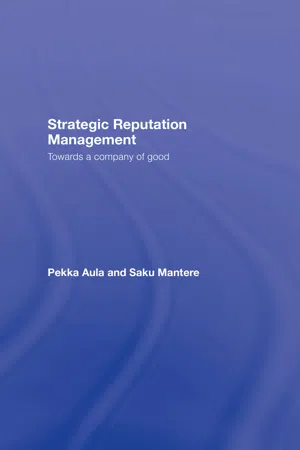
Strategic Reputation Management
Towards A Company of Good
Pekka Aula,Saku Mantere
- 242 pages
- English
- ePUB (mobile friendly)
- Available on iOS & Android
Strategic Reputation Management
Towards A Company of Good
Pekka Aula,Saku Mantere
About This Book
Strategic Reputation Management examines the ways in which organizations achieve "goodness" through reputation, reputation management and reputation strategies. It presents a contemporary model of strategic reputation management, helping organizations and stakeholders to analyze the business environment as a communicative field of symbols and meanings in which the organization is built or destroyed. Authors Pekka Aula and Saku Mantere introduce the eight generic reputation strategies, through which organizations can organize their stakeholder relationships in various ways. They illustrate their arguments using real-world examples and studies, from the Finnish Ski Association to Philip Morris International.
This book serves as required reading in advanced courses covering public relations practice, advanced topics in PR, corporate communication, management, and marketing. Professionals working in PR, business, management and marketing will also find much of interest in this volume.
Frequently asked questions
Part I
The company of good
A contradiction in terms?
Chapter 1
The question concerning the good company
A good question
This world is always chasing after clichés, always trying to function according to them regardless of what cliché it is that time—the information society, IT shares, the new economy … And these clichés de facto change the way we function.(Business area director of a major international corporation)
Company | Brand | Crimes |
|---|---|---|
Chevron Texaco | Texaco | American oil and gas giant. Guilty of human rights violations in Nigeria and environmental crimes in the Amazon. |
Coca-Cola | Nestea, Powerade, Bonaqua | American refreshment drinks giant. Infringed on workers’ rights and guilty of discrimination in the USA and Central and Latin America. |
DuPont | Teflon | American chemical giant. The company’s product has caused injury to people and damage to nature. |
Hyundai/Kia | Kia Sportage, Hyundai Getz | Korean car manufacturer. Has restricted unions from operating, maintains poor working conditions in South Korea. |
Marriott | Marriott Hotel in Copenhagen, Renaissance Hotel in Amsterdam | American hotel chain. Sexual harassment of minors in company offices in Costa Rica. |
Sanyo Electric | Sanyo, Fisher | Japanese electronics manufacturer. Discrimination against women at its production plant in Mexico. |
Unilever | Omo, Flora, Magnum | Dutch foodstuffs company. Subsidiary guilty of environmental crimes in India. |
Wal-Mart | Wal-Mart | American shop chain. Discrimination against women in Guatemala, restricted unions from operating, infringed on workers’ rights in USA. |
The fund invests globally in equities and equity-related securities. The ethical restrictions are based upon GES®, Global Ethical Standard, which origins from international norms concerning human rights, labor, environment, bribes, corruption, and weapons. The fund also excludes companies for which more than 5 percent of the business is derived from weapons, alcohol, tobacco, gambling, and pornography. The ethical review is performed by GES Investment Services. SEB donates 13.5 percent of the fund’s management fee to the WWF every year.(www.seb.se, read June 7, 2005)
It is the Advisor’s philosophy that although often considered politically incorrect, these and similar industries and products … will continue to experience significant capital appreciation during good and bad markets. The Advisor considers these industries to be nearly “recession-proof.”(Vice Fund Prospectus, July 31, 2006, p. 2)
Project | Objective | Target region | Program value 2005 (US$ millions) | Patients reached 2005 |
|---|---|---|---|---|
Malaria/WHO | Provide Coartem at cost for public-sector use | Africa, Asia, Latin America | 361 | 5,600,000 |
Leprosy | Eliminate leprosy by providing free medications to all patients worldwide with WHO through 2010 | Global | 32 | 407,0003 |
Tuberculosis | Donation of fixed-dose combinations4 | Tanzania, Sri Lanka | 35 | 20,000 |
Novartis Institute for Tropical Diseases (NITD) | Discover novel treatments and prevention methods for major tropical diseases; NITD discoveries to be available in poor endemic countries without profit | Developing countries | 10 | |
Novartis Foundation for Sustainable Development | Work at policy and field level to improve access to healthcare for the world’s poorest people | Developing countries | 7 | 58,000 | ...
Table of contents
- Cover
- Half Title
- Series Page
- Title Page
- Copyright Page
- Table of Contents
- List of figures and tables
- Preface
- Part I The company of good: a contradiction in terms?
- Part II Strategic reputation management
- Part III Managing the company of good
- Part IV Conclusion
- Notes
- References
- Index